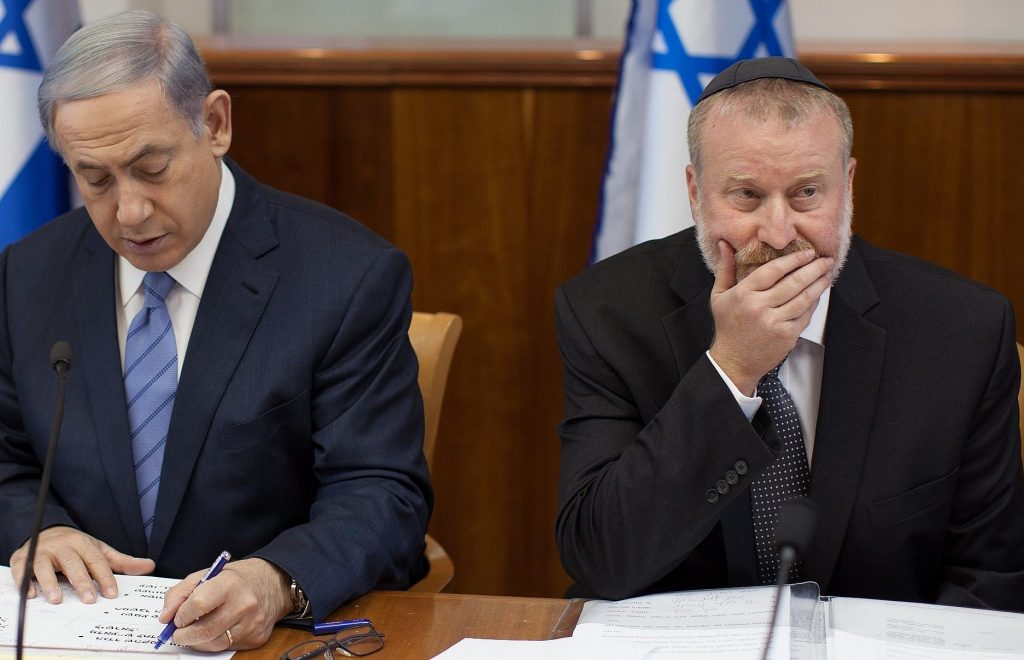Australia/Israel Review
Behind the News – January 2019
Dec 21, 2018 | AIJAC staff

Police recommend charging Bibi
On Dec. 2, Israel Police recommended indicting Israel’s Prime Minister Binyamin Netanyahu and his wife, Sara, on charges of bribery, fraud and breach of public trust, as part of “Case 4000”.
Case 4000 is comprised of two key allegations. The first claim is that Netanyahu replaced Communications Ministry Director-General Avi Berger with his ex-campaign manager, Shlomo Filber, to advance the interests of Bezeq telecommunications mogul Shaul Elovitch.
The second allegation is that in exchange for helpful policies towards Bezeq, the Netanyahus requested favourable media coverage through Bezeq’s online news site Walla!.
Attorney-General Avichai Mandelblit will now decide whether to accept the recommendations and indict Netanyahu.
This is the third time in the past year that Israeli Police have recommended indicting Netanyahu on unrelated charges.
Rocket and terror report
On Dec. 9, a Palestinian terrorist riding in a car sprayed bullets into a group of people at a bus stop in front of the Israeli settlement of Ofra. Seven people were wounded, including a pregnant woman. The baby, which was delivered prematurely while the mother remained in critical condition, later died.
Meanwhile, while weekly “March of Return” protests continued, the Gaza border has returned to relative quiet following the short but intense escalation on Nov. 12-13 as Hamas has maintained calm in the strip while Egyptian-brokered negotiations over a possible long-term truce with Israel are ongoing.
More Iranians indicted for cyber crimes
On Nov. 28, the US unsealed a six-count indictment against two Iranian hackers charged with extorting hospitals, universities, government agencies, and several US municipal governments, using ransomware they developed called SamSam, getting millions of dollars in ransom and causing over US$30 million in damage. While they are not accused of working directly for the Islamic Revolutionary Guard Corps (IRGC), Iranian intelligence is known to outsource hacking to “independent” programmers to perpetrate acts of cybercrime around the world.
In Iran, reports say the IRGC commander of the Basij paramilitary militia Brig. Gen. Gholamhossein Gheybparvar is trying to form what some have described as a “cyber Hezbollah”, with thousands of young volunteers being recruited for a cyberwarfare division.
Israeli claims on nuclear warehouse confirmed
On Nov. 28, an independent enquiry by the respected US-based think-tank the Institute for Science and International Security appeared to confirm Israeli claims from September about a newly detected undeclared Iranian nuclear site. The warehouse in the Turquz Abad district in Teheran is suspected to have been used for storing radioactively contaminated material and equipment produced in Teheran’s clandestine nuclear program. Satellite imagery and photos from various sources collected by the Institute revealed how shipping containers were hastily removed from the site over recent months following Israel’s exposure, on April 30, of Iran’s secret nuclear archives hidden in a warehouse nearby. The satellite imagery also disproved Iranian claims that the site was a carpet cleaning facility.
Iran ramps up ballistic missile tests
US Secretary of State Mike Pompeo revealed on Dec. 1 that Iran had test-fired a medium-range missile capable of carrying multiple warheads. He warned that Europe and all of the Middle East are within the range of the new missile, and alleged that it violates UN Security Council resolution 2231, which endorsed the 2015 nuclear agreement with Iran (JCPOA). Pompeo called on Teheran to immediately cease all efforts to develop such missiles – a call later joined by the UK, France and Germany.
In a German newspaper report on Dec. 9, Western intelligence sources confirmed the number of Iranian ballistic missile tests has more than doubled over the past year. Among the missiles tested were seven medium range and five short-range and cruise missiles, which could reach the EU and be fitted with nuclear warheads.
US, UK: Syrian chlorine attack was false flag operation
The US and UK have accused the Syrian Assad regime and Russia of staging a chemical weapons attack against civilians in Aleppo on Nov. 24 and blaming it on Syrian rebels. The Assad regime claimed the attack had injured 100 people and was carried out by rebels in Idlib, the last opposition-held province in Syria.
The US State Department said: “The United States strongly refutes this narrative and has credible information that pro-regime forces likely used teargas against civilians in Aleppo on November 24.” Similarly, the British Foreign Office said the Nov. 24 attack was likely “a staged incident intended to frame the opposition.”
New document Reveals ISIS-Hamas ties
A recently revealed 11-page religious response written by prominent ISIS cleric Abu Maram Al-Jazairi discussing ISIS’ relationship with Hamas provides further evidence that Hamas forces in Gaza provided significant aid to the branch of ISIS in Egypt’s Sinai Peninsula.
Hamas supplied weapons, money and logistic support with the knowledge of the ISIS leadership, according to the document. The document reveals an internal dispute among ISIS leaders and members regarding the propriety of accepting assistance from Hamas, which ISIS views as Islamist but ultimately heretical for a variety of reasons.
Meanwhile, in late November, the Islamic State affiliate in Sinai confiscated an Iranian weapons shipment – including a number of Kornet laser-guided anti-tank missiles – intended for Hamas, Kuwaiti media reported.
PA targets land Sales to Jews
The Palestinian Authority (PA) security forces are targeting Jerusalem residents suspected of selling properties to Israeli Jews, on “direct orders” from PA President Mahmoud Abbas, a Fatah spokesman announced on Nov. 22. The spokesman also confirmed that PA security forces had recently arrested American-Palestinian businessman Issam Akel on suspicion of selling a Jerusalem home to Jews.
US Ambassador to Israel David Friedman has demanded the PA release Akel.
Israel’s latest diplomatic achievements
The President of Chad, Idriss Deby, made a surprise visit to Israel on Nov. 25, a first-ever for a leader of that Muslim-majority nation. While the visit does not officially renew diplomatic ties, which Chad severed under Arab pressure in 1972, Deby discussed security-related issues during his visit, including arms deals, and expressed optimism for future relations. Israel has reportedly been discreetly helping Chad confront its Islamist terrorist threats.
In addition, it was recently revealed that Israel conducted secret, high-level diplomatic meetings with Sudanese representatives in Istanbul to explore re-establishing ties, and is also reaching out to Mali and Niger.
Landmark Israel-EU gas pipeline agreement
Israel, Cyprus, Greece and Italy, with the support of the EU, have reached an agreement to lay the world’s longest underwater gas pipeline, linking the eastern Mediterranean to Europe, it was announced on Nov. 24. The pact is set to be inked in February, with the pipeline scheduled to go online by 2025. The pipeline would tap Israel’s offshore Leviathan gas field and route gas to mainland Europe via Cyprus, Crete and Italy. At a depth of 3-3.5 km below sea level and spanning 2,100 km, the pipeline would have a capacity of 10-20 billion cubic meters of gas, supplying Europe with 125 billion cubic metres of natural gas annually by 2030.






